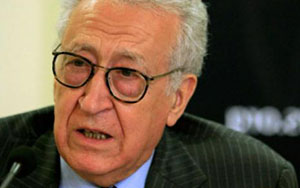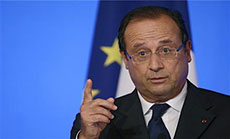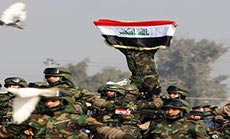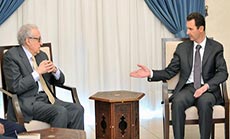Ibrahimi Attacks Al-Assad’s Initiative, Syrian Daily: Ibrahimi A Tool for Implementing Western-Arab Policies

Local Editor
Hours before his scheduled meeting with Deputy Russian Foreign Minister Mikhail Bogdanov and US Assistant Secretary of State William Burns in Geneva, the international envoy to Syria al-Akhdar Ibrahimi launched an attack on Syrian President Bashar al-Assad's initiative.
 In remarks to BBC, Ibrahimi expressed regret at the "lost opportunity" to help resolve a deepening crisis.
In remarks to BBC, Ibrahimi expressed regret at the "lost opportunity" to help resolve a deepening crisis.
He further revealed that the al-Assad had informed him, during their last meeting on 24 December, that "he was thinking of taking a new initiative".
Ibrahimi said he told him that "it would have to be different from initiatives in the past... which had not changed the situation one iota".
"What has been said this time is not really different. It is perhaps even more sectarian, more one-sided," he claimed, before apologizing for the use of the word "sectarian".
"It was a slip of the tongue," Ibrahimi said, and noted that "Syrians are talking past each other, speaking two totally different languages."
He reiterated his view that if there was no political solution this year, by 2014 "there would be no Syria".
"The opposition may win in the long-term. But by the time they do, there will be no Syria, so what kind of victory is that?" Ibrahimi wondered.
In parallel, he confirmed reports that the president also told him that he was thinking of running in the next presidential election, which is scheduled for 2014.
The veteran 79-year-old envoy said, in careful diplomatic language: "I think what people are saying is a family ruling for 40 years is a little bit too long." President al-Assad succeeded his father Hafez in 2000 when he passed away after 29 years at the helm."
"I think he [al-Assad] used the word [transition]," Ibrahimi stated, and noted that "but whether he means the transition that is needed is uncertain."
Moreover, he unveiled that on recent trips to Damascus, al-Assad's senior advisers told him not only that he should run again for president, but that they also believed he would win.
On the regional level, Ibrahimi said regional powers, also dangerously split on this worsening crisis, were also unable to respond. He now planned to focus his efforts on the "outer ring" of the international community, he added.
Asked if there had been a breakthrough on the US-Russian front over Syria, Ibrahimi replied: "The fact we are talking in a trilateral formula is a step forward."
According to him, the new strategy is to try to forge enough agreement among key outside players "to push, encourage, invite" Syrians to begin a dialogue.
Meanwhile, Ibrahimi outlined some possible scenarios, including a move towards a more powerful parliament with an elected prime minister.
He expressed concern about "all the conspiracy theories" appearing in the media about secret deals brokered between foreign powers to keep President al-Assad in office, which he insisted had no basis in reality.
For its part, the Syria al-Watan newspaper slammed Ibrahimi's remarks by saying: "The international envoy to Syria unveiled the so-called mask of integrity and impartiality since his appointment to succeed Kofi Annan."
"Ibrahimi revealed his true face, which sees the Syrian crisis by one eye, in an attempt to assure his masters," the daily added.
It also accused the international envoy of "being only a tool for the implementation of the policy of some Western and regional countries toward Syria."
Source: al-Ahed News, Translated and Edited by moqawama.org
Comments

France’s Hollande in Qatar for Warplane Deal
9 years ago
Iraq Police Dismantles Al-Qaeda Protest Site
10 years ago

